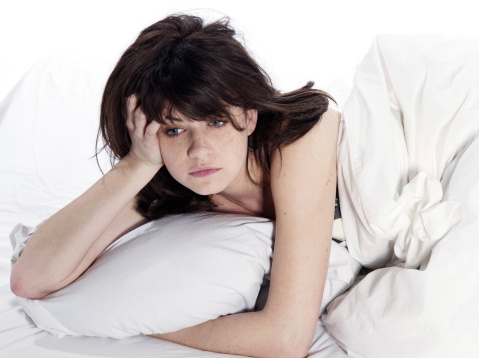
But experts also say several bad sleep problems and habits will ruin the potential of getting your day off to a good start and could lead to mental health problems like stress or anxiety down the road. Here are a few of the more common bad sleep habits that you should be avoiding:
Sleep Problems That Could Lead to Poor Mental Health
1. Do Not Lie Awake Waiting to Fall Asleep
If this sleep problem occurs often, you could be dealing with insomnia. Be careful of this bad sleep habit because you could begin to associate night hours with stress and anxiety rather than being asleep. Try a relaxing activity to calm your brain before bed to combat this behavior.
2. If You Need to Urinate – Do It
If there you are uncomfortable in any way, you are going to have sleep problems. But there is very little that is more disruptive to sleep, not to mention a source of anxiety and stress, than having the urgent need to urinate. Not only this but being overfull from too large of dinner is bad news as well, further adding to the discomfort.
3. Keep Distractions to a Minimum
Like so many people, you may have any number of electronic devices in your bedroom. If you have the lights, TV, and stereo on, sleep will become very difficult. Keeping your bedroom calm and quiet will help you associate it with good sleep, rather than being a source of stress and anxiety.
4. Drinking to Try and Relax
While drinking alcohol might help you feel a little tired, which can help with your sleep problems in the short term, it can ultimately lead to disrupted sleep patterns. Naturally, the opposite is also true in terms of anything that has caffeine in it. Things like coffee, tea, and chocolate will do wonders towards keeping you awake. Experts say you should avoid this type of food and drink up to 6 hours before you turn in.
As expected, ridding yourself of daily stress and anxiety will ultimately lead you to better sleep and a reduction in sleep problems. Keep in mind that any sudden change will also disrupt your sleep and cause you to feel unwell the next day. Taking a warm bath and any quiet sleep ritual that you can incorporate could really help in the fight against insomnia.
5. Eating Too Close to Bedtime
When ingesting a large meal, the body can have a hard time relaxing and falling asleep. Lying down after eating can also cause indigestion and heartburn, which can make it uncomfortable to sleep. Try to eat earlier in the evening and avoid late-night snacking as this can also trigger digestive issues that can interfere with sleep.
6. Drinking Coffee Late in the Day
It can be tempting to reach for a coffee after dinner, but you may regret it once bedtime rolls around. The effects of coffee can be felt for up to 8 hours after consumption, so it is best to cut off all cups in the afternoon. Caffeine stimulates the nervous system causing increased brain activity and wakefulness, which are not conducive to sleep.
7. Sleeping with Your Screen
The sleep hormone melatonin can be influenced by light, and by looking at a bright screen in the evenings, the blue light can mimic the effects of sunlight which tells the brain to stay awake. This blue light can inhibit melatonin production and the ability to fall asleep.
8. Working up a Sweat before Bed
Exercise releases endorphins which increase core body temperatures and raise cortisol levels, all of which can leave you full of adrenaline and hinder sleep. While regular exercise is essential for overall health, it is essential to remember to work up a sweat earlier in the day for better sleep.
9. Pulling All-Nighters, Oversleeping on Weekends
The natural circadian rhythm can be affected when sleep patterns shift on a regular basis. Sleeping in opposition to the circadian rhythm can cause a hormonal imbalance that makes it difficult to sleep and may even lead to chronic insomnia.
10. You Don’t Wash and Change Your Bedding
Sleep hygiene can play an important part in getting a well-rested night’s sleep. Change sheets weekly, and try to purchase bedding with higher thread counts and high-quality materials for the ultimate sleep experience.
